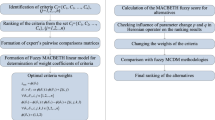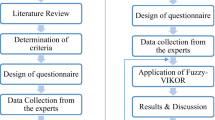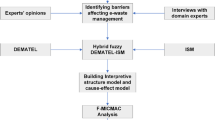Abstract
This study contributes to identifying a valid and reliable set of barriers to sustainable solid waste management framework rooted in society 5.0 perspectives in Taiwan. The SSWM-related causal interrelationships within the proposed hierarchical structure, and critical barriers for the practical improvement and enhancement of SSWM performance are identified as preference enriching both literature and practices. In nature, the hierarchical structure is with the causal interrelationships under uncertainties. The perspective empowers the creation of a new biosphere based on technological progress, but in the sustainable solid waste management field, it is difficult to encounter and shape the systematized processes due to barriers and challenges. To address this shortcoming, this study evaluates the technical challenges faced in the field of sustainable solid waste management toward society 5.0. The valid attributes are usually described the qualitative information. The fuzzy Delphi method is applied to acquire the valid and reliable attributes. Fuzzy decision-making trial and evaluation laboratory experiment is to visualize the causal interrelationships among the attributes. Choquet integral with respect to the nonadditive attributes over the valid set provides an overall perspective function. The results establish an understanding of sustainable solid waste management barriers in the perspectives under uncertainties. Community uncertainty, policy and regulation problems, city architecture, and technology interaction are the factors that influence sustainable performance. In practices, (1) diverse disciplines and sectors in local, national, and global communities; (2) a lack of mobility and reliability; (3) mass production and mass consumption; (4) an insufficient level of artificial intelligence application; and (5) failures related to data management and security hinder the improvement of sustainable solid waste management toward society 5.0. The social and technical perspectives are indicated as the top priorities to improve SSWM performance.










Similar content being viewed by others
Data availability
No authorized.
References
Aid G, Eklund M, Anderberg S, Baas L (2017) Expanding roles for the Swedish waste management sector in inter-organizational resource management. Resour Conserv Recycl 124:85–97
Altan A, Karasu S (2019) The effect of kernel values in support vector machine to forecasting performance of financial time series. The Journal of Cognitive Systems 4(1):17–21
Anagnostopoulos T, Zaslavsky A, Kolomvatsos K, Medvedev A, Amirian P, Morley J, Hadjieftymiades S (2017) Challenges and opportunities of waste management in IoT-enabled smart cities: a survey. IEEE Transactions on Sustainable Computing 2(3):275–289
Aslan, O., Altan, A., & Hacioglu, R. (2017). The control of blast furnace top gas pressure by using fuzzy PID. In Proceedings of the fifth international conference on advances in mechanical and robotics engineering–AMRE (pp. 22–26).
Attarmoghaddam, N. (2018, June). Evaluating factors affecting the incubation phase of NPD in knowledge-based companies. In XXIX ISPIM INNOVATION CONFERENCE.
Bottero, M., Ferretti, V., & Mondini, G. (2013). A Choquet integral-based approach for assessing the sustainability of a new waste incinerator. International Journal of Multicriteria Decision Making 73–74, 3(2–3), 157–177.
Bryndin E (2018) System synergetic formation of society 5 0 for development of vital spaces on basis of ecological economic and social programs. Annals of Ecology and Environmental Science 2(4):12–19
Bui TD, Tsai FM, Tseng ML, Ali MH (2020) Identifying sustainable solid waste management barriers in practice using the fuzzy Delphi method. Resources, conservation and recycling 154:104625
Bui TD, Tsai FM, Tseng ML, Wu KJ, Chiu AS (2020) Effective municipal solid waste management capability under uncertainty in Vietnam: utilizing economic efficiency and technology to foster social mobilization and environmental integrity. Journal of Cleaner Production 259:120981
Casazza M, Gioppo L (2020) A playwriting technique to engage on a shared reflective enquiry about the social sustainability of robotization and artificial intelligence. Journal of Cleaner Production 248:119201
Dubey S, Singh P, Yadav P, Singh KK (2020) Household Waste Management System Using IoT and Machine Learning. Procedia Computer Science 167:1950–1959
Environmental Protection Administration. Executive Yuan. 2020. Regulation for recycling, clearance and disposal of general wastes. Available online: https://law.moj.gov.tw/LawClass/LawAll.aspx?pcode=O0050024 (accessed on 1 March, 2021).
Environmental Protection Administration. Executive Yuan. 2021. Taiwan keeps striving to reduce carbon despite rankings by global performance index. Available online: https://www.epa.gov.tw/eng/F7AB26007B8FE8DF/04820b7c-f312-4a80-bced-398ba51a2b39 (accessed on 1 March, 2021).
Ferreira CM, Serpa S (2018) Society 5.0 and social development. Management and Organizational Studies 5:26–31
Foresti R, Rossi S, Magnani M, Bianco CGL, Delmonte N (2020) Smart society and artificial intelligence: big data scheduling and the global standard method applied to smart maintenance. Engineering 6(7):835–846
Fukuda K (2020) Science, technology and innovation ecosystem transformation toward society 5 0. International Journal of Production Economics 220:107460
Fukuyama M (2018) Society 5.0: Aiming for a new human-centered society. Japan Spotlight 27:47–50
Fusch PI, Ness LR (2015) Are we there yet? Data saturation in qualitative research. The Qualitative Report 20(9):1408
Gladden ME (2019) Who will be the members of Society 5 0? Towards an anthropology of technologically posthumanized future societies. Social Sciences 8(5):148
Gonzalez ED, Sarkis J, Huisingh D, Huatuco LH, Maculan N, Montoya-Torres JR, de Almeida CM (2015) Making real progress toward more sustainable societies using decision support models and tools: introduction to the special volume. J Clean Prod 105:1–13
Grabisch M (1996) The application of fuzzy integrals in multicriteria decision making. Eur J Oper Res 89(3):445–456
Guest G, Bunce A, Johnson L (2006) How many interviews are enough? An experiment with data saturation and variability. Field Methods 18(1):59–82
Gutberlet J, Carenzo S, Kain JH, Martiniano M, de Azevedo A (2017) Waste picker organizations and their contribution to the circular economy: Two case studies from a global south perspective. Resources 6(4):52
Ikhlayel M (2018) Indicators for establishing and assessing waste management systems in developing countries: a holistic approach to sustainability and business opportunities. Business Strategy & Development 1(1):31–42
Ishikawa A, Amagasa M, Shiga T, Tomizawa G, Tatsuta R, Mieno H (1993) The max-min Delphi method and fuzzy Delphi method via fuzzy integration. Fuzzy Sets Syst 55(3):241–253
Islam KN, Jashimuddin M (2017) Reliability and economic analysis of moving towards wastes to energy recovery based waste less sustainable society in Bangladesh: The case of commercial capital city Chittagong. Sustain Cities Soc 29:118–129
Keogh, J. G., Dube, L., Rejeb, A., Hand, K. J., Khan, N., & Dean, K. (2020). The future food chain: digitization as an enabler of society 5.0. Building the Future of Food Safety Technology;Detwiler, D., Ed.
Mandal SN, Choudhury JP, Chaudhuri SB (2012) In search of suitable fuzzy membership function in prediction of time series data. International Journal of Computer Science Issues 9(3):293–302
Mavrodieva AV, Shaw R (2020) Disaster and climate change issues in Japan’s society 5 0–a discussion. Sustainability 12(5):1893
Mohanty R, Kumar BP (2021) Urbanization and smart cities. In: Solving urban infrastructure problems using Smart City Technologies. Elsevier, pp 143–158
Murayama A (2020) Institutional instruments for urban systems designdfrom the planner’s perspective. Urban Systems Design: Creating Sustainable Smart Cities in the Internet of Things Era, 409.
Nguyen KLP, Chuang YH, Chen HW, Chang CC (2020) Impacts of socioeconomic changes on municipal solid waste characteristics in Taiwan. Resources, Conservation and Recycling 161:104931
Onoda H (2020) Smart approaches to waste management for post-COVID-19 smart cities in Japan. IET Smart Cities 2(2):89–94
Roblek V, Meško M, Bach MP, Thorpe O, Šprajc P (2020) The interaction between internet, sustainable development, and emergence of society 5 0. Data 5(3):80
Sakr D, Baas L, El-Haggar S, Huisingh D (2011) Critical success and limiting factors for eco-industrial parks: global trends and Egyptian context. J Clean Prod 19(11):1158–1169
Sharma, M., Joshi, S., Kannan, D., Govindan, K., Singh, R., & Purohit, H. C. (2020). Internet of things (IoT) adoption barriers of smart cities’ waste management: an Indian context. Journal of Cleaner Production, 122047.
Sung HC, Sheu YS, Yang BY, Ko CH (2020) Municipal solid waste and utility consumption in Taiwan. Sustainability 12(8):3425
Tabaa M, Monteiro F, Bensag H, Dandache A (2020) Green Industrial Internet of Things from a smart industry perspectives. Energy Rep 6:430–446
Tanaka, M. (2014). Sustainable society and municipal solid waste management. In Municipal Solid Waste Management in Asia and the Pacific Islands (pp. 1–14). Springer, Singapore.
Tsai FM, Bui TD, Tseng ML, Wu KJ (2020) A causal municipal solid waste management model for sustainable cities in Vietnam under uncertainty: A comparison. Resources, Conservation and Recycling 154:104599
Tsai, F. M., Bui, T. D., Tseng, M. L., Lim, M. K., Wu, K. J., & Mashud, A. H. M. (2020a). Assessing a hierarchical sustainable solid waste management structure with qualitative information: Policy and regulations drive social impacts and stakeholder participation. Resources, Conservation and Recycling, 105285.
Tseng ML, Chiang JH, Lan LW (2009) Selection of optimal supplier in supply chain management strategy with analytic network process and choquet integral. Comput Ind Eng 57(1):330–340
Tseng ML, Lin YH, Lim MK, Teehankee BL (2015) Using a hybrid method to evaluate service innovation in the hotel industry. Appl Soft Comput 28:411–421
Tseng ML, Wu KJ, Lee CH, Lim MK, Bui TD, Chen CC (2018) Assessing sustainable tourism in Vietnam: a hierarchical structure approach. J Clean Prod 195:406–417
United Nations (2020). Transforming our world: the 2030 agenda for sustainable development. https://sustainabledevelopment.un.org/post2015/transformingourworld. (accessed on 1 March, 2021).
Wu KJ, Tseng ML, Chiu AS, Lim MK (2017) Achieving competitive advantage through supply chain agility under uncertainty: a novel multi-criteria decision-making structure. Int J Prod Econ 190:96–107
Wu KJ, Tseng ML, Lim MK, Chiu AS (2019) Causal sustainable resource management model using a hierarchical structure and linguistic preferences. J Clean Prod 229:640–651
Yeh LT (2020) Analysis of the dynamic electricity revenue inefficiencies of Taiwan’s municipal solid waste incineration plants using data envelopment analysis. Waste Manage 107:28–35
Yukalang N, Clarke B, Ross K (2017) Barriers to effective municipal solid waste management in a rapidly urbanizing area in Thailand. Int J Environ Res Public Health 14(9):1013
Funding
This study is partially supported from MOST 110–2222-E-468–002-, Ministry of Science and Technology, Taiwan.
Author information
Authors and Affiliations
Contributions
Tat-Dat Bui—conceptualize, original version, and finalized the final version; and Ming-Lang Tseng—conceptualize, original version, and finalized the final version.
Corresponding author
Ethics declarations
Consent to participate.
Not applicable.
Consent to publish.
Not applicable.
Ethics approval
Not applicable.
Competing interests
Not applicable.
Additional information
Responsible Editor: Eyup Dogan
Publisher's note
Springer Nature remains neutral with regard to jurisdictional claims in published maps and institutional affiliations.
Rights and permissions
About this article
Cite this article
Bui, TD., Tseng, ML. Understanding the barriers to sustainable solid waste management in society 5.0 under uncertainties: a novelty of socials and technical perspectives on performance driving. Environ Sci Pollut Res 29, 16265–16293 (2022). https://doi.org/10.1007/s11356-021-16962-0
Received:
Accepted:
Published:
Issue Date:
DOI: https://doi.org/10.1007/s11356-021-16962-0




